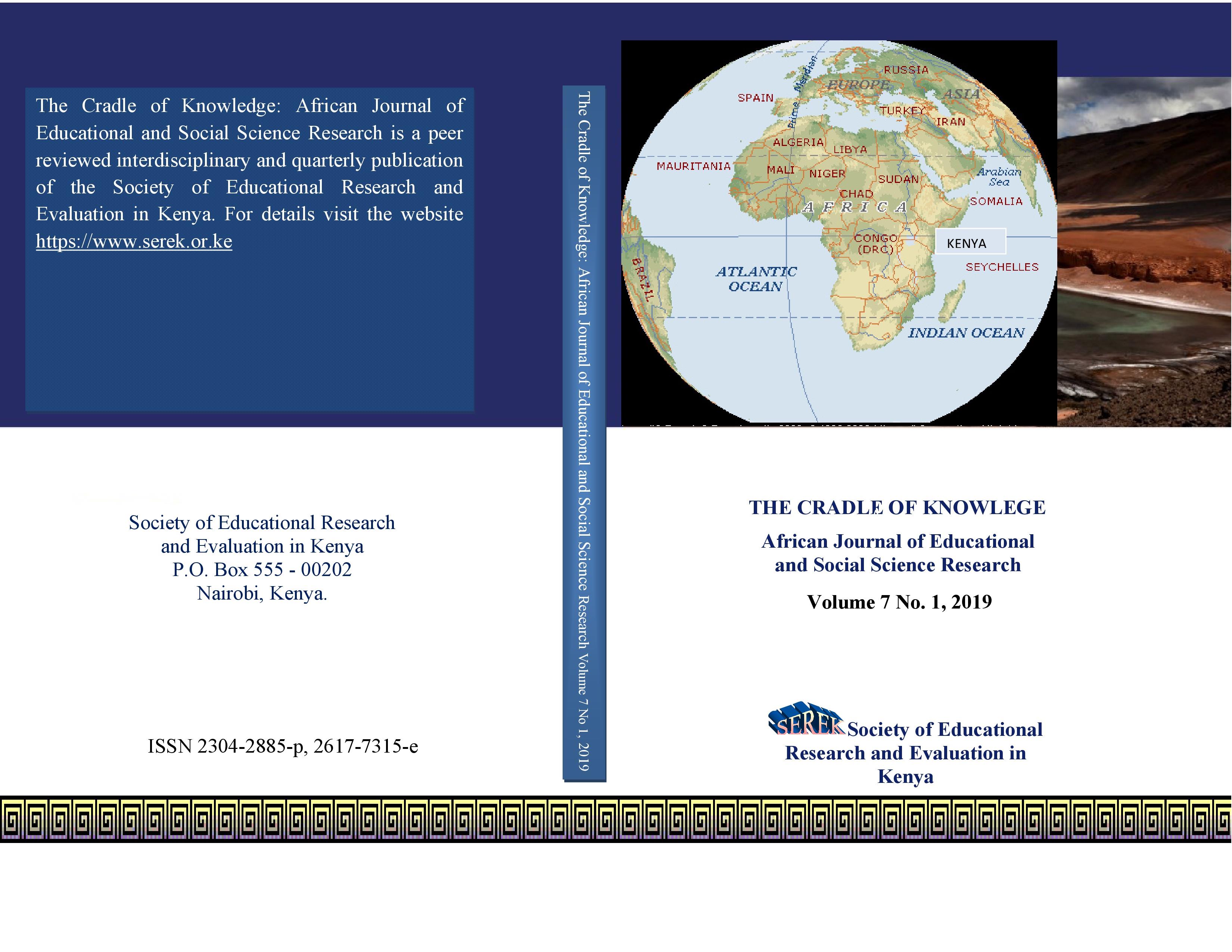
Teacher Preparedness for the Implementation of Competency Based Curriculum in Kenya: A Survey of Early Grade Primary School Teachers’ in Bomet East Sub-County
Abstract
of CBC, establish their capacity to realign teaching/learning resources to CBC, determine their preparedness to realign teaching/learning approaches to the demands of CBC and their capacity to evaluate a CBC curriculum. Data was collected using questionnaires and interviews. Analysis of data reveals that teachers are inadequately prepared. Their knowledge of CBC is vague and this has hampered their delivery and evaluation. It is also recommended that KICD and ministry of education plans for more training sessions to bridge capacity gaps highlighted in pedagogy, Assessment and preparation of teaching documents. Key Words: Preparedness, Assessment, Competency based curriculum, Early Grade Education, Kenya.
Full Text:
PDFReferences
Biggs, J. (1996) Assessing learning quality: Reconciling institutional, staff and educational demands, Assessment & Evaluation in Higher Education, Vol. 21, Issue 1, pp.5-11.
Creswell, J. W. (2007). Qualitative inquiry and research design: Choosing among five approaches (2nd ed.) Thousand Oaks, California: Sage Publication, Inc.
Creswell, J. W. (2008). Educational Research: Planning, conducting, and evaluating quantitative and qualitative research. Upper Saddle River, New Jersey: Pearson Education Inc.
Kothari, C. R. (2014). Research Methodology: Methods and Technique. New Delhi: New Age Publishers.
Momentum schools.org and Oklahoma public school Resource Centre (2017).
Njengere, D. (2017). The Why, What and How of Competency- based Curriculum Reforms: The Kenyan Experience. Unesco international Bureau of Education.
Nthulanyane, M. R. (2004). Teacher receptivity of an integrated curriculum with special reference to the foundation phase of curriculum 2005. Unpublished thesis, University Of Port Elizabeth, South Africa.
OECD (2016), PISA 2015 Results (Volume II): Policies and Practices for Successful Schools, PISA, OECD Publishing, Paris, https://doi.org/10.1787/9789264267510-en.
Rop, P. (2013). Challenges facing implementation of the integrated English curriculum in Kenya: a case of selected secondary schools in Kenya. Journal of Social Sciences Resources, Vol. 2, No. 3 pp. 21 -36, ISSN 2321-
Stufflebeam, D. L. (2000). The CIPP model for evaluation. In Stufflebeam, D.L., Madaus, G.F. Kellaghan, T. (Eds).
Evaluation models. Viewpoints on educational and human service evaluation. (pp. 279-317). (2nd ed). Boston: Kluwer Academic.
Strugies, C. (2015). Why a competency-based system is needed: 10 ways the traditional contributes to inequity. https/www.competency works.org/equity.
Wanzala, O. (2018). Questions raised on teachers’ readiness for new curriculum. Daily Nation, July 22, 2018.
Witty, E., & Gaston, B. (2008). Competency Based Learning and Assessment. Etito
World Bank (2018). Early grade mathematics training manual. Washington.
Refbacks
- There are currently no refbacks.
License URL: https://www.serek.or.ke
SEREK publication https://serek.or.ke
This work is licensed under a Creative Commons Attribution 4.0 International License